-
 Bitcoin
Bitcoin $83,301.7640
-2.11% -
 Ethereum
Ethereum $1,799.9842
-4.25% -
 Tether USDt
Tether USDt $0.9999
0.00% -
 XRP
XRP $2.0278
-4.59% -
 BNB
BNB $596.2228
-1.03% -
 USDC
USDC $1.0001
0.01% -
 Solana
Solana $116.8645
-7.35% -
 Dogecoin
Dogecoin $0.1617
-6.43% -
 Cardano
Cardano $0.6450
-5.42% -
 TRON
TRON $0.2321
-2.68% -
 Toncoin
Toncoin $3.6664
-9.62% -
 UNUS SED LEO
UNUS SED LEO $9.4145
0.16% -
 Chainlink
Chainlink $12.8328
-5.91% -
 Stellar
Stellar $0.2589
-3.37% -
 Avalanche
Avalanche $18.1600
-6.54% -
 Sui
Sui $2.2723
-8.51% -
 Shiba Inu
Shiba Inu $0.0...01214
-1.89% -
 Hedera
Hedera $0.1611
-4.12% -
 Litecoin
Litecoin $82.9489
0.17% -
 Polkadot
Polkadot $3.9725
-3.23% -
 MANTRA
MANTRA $6.2949
0.51% -
 Bitcoin Cash
Bitcoin Cash $302.6917
-1.17% -
 Bitget Token
Bitget Token $4.5396
-1.25% -
 Dai
Dai $1.0000
0.00% -
 Ethena USDe
Ethena USDe $0.9998
-0.01% -
 Pi
Pi $0.6249
-7.33% -
 Monero
Monero $213.0395
-1.33% -
 Hyperliquid
Hyperliquid $11.5526
-14.44% -
 Uniswap
Uniswap $5.9462
-2.98% -
 Aptos
Aptos $5.2007
-2.20%
Why is blockchain called a “decentralized” technology?
Blockchain's decentralized nature distributes control across a network, enhancing security and transparency, unlike centralized systems where a single entity manages all transactions.
Apr 02, 2025 at 10:00 am
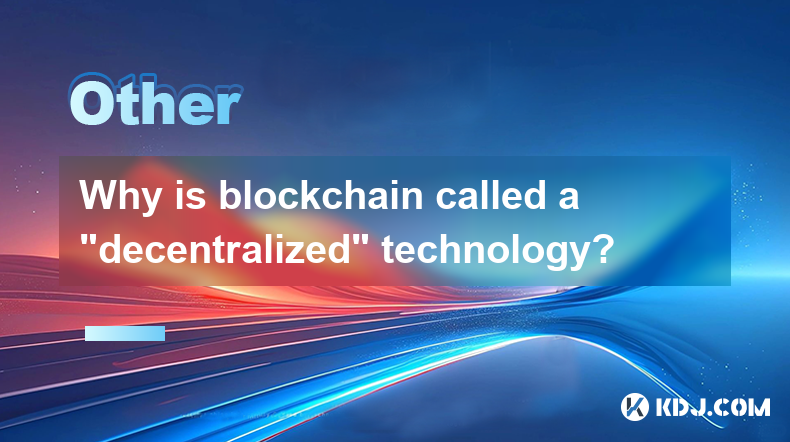
Blockchain technology is often referred to as "decentralized" due to its unique structure and operational principles that differ significantly from traditional centralized systems. In a centralized system, a single entity or authority controls the entire network, managing and validating all transactions. In contrast, blockchain operates on a network of computers, where each participant has a copy of the entire ledger, and transactions are validated collectively by the network. This decentralized nature ensures that no single entity has control over the entire system, promoting transparency, security, and resilience against failures or attacks.
Understanding Decentralization in Blockchain
Decentralization in blockchain refers to the distribution of control and decision-making across a network of participants rather than a central authority. This is achieved through a consensus mechanism, where multiple nodes (computers) on the network agree on the validity of transactions before they are added to the blockchain. This process eliminates the need for intermediaries, reducing the risk of fraud and increasing trust among users. The decentralized nature of blockchain also means that the system can continue to operate even if some nodes fail or are compromised, making it more robust and reliable.
The Role of Consensus Mechanisms
Consensus mechanisms are crucial to the decentralized operation of blockchain. They ensure that all participants agree on the state of the ledger, preventing any single entity from manipulating the data. Common consensus mechanisms include Proof of Work (PoW) and Proof of Stake (PoS). In PoW, participants (miners) compete to solve complex mathematical problems to validate transactions and add them to the blockchain. PoS, on the other hand, selects validators based on the number of coins they hold and are willing to "stake" as collateral. Both mechanisms ensure that the network remains decentralized and secure.
Benefits of Decentralization
Decentralization in blockchain offers several benefits. Firstly, it enhances security by distributing the data across multiple nodes, making it difficult for hackers to compromise the entire network. Secondly, it promotes transparency, as all participants can view and verify transactions on the public ledger. Thirdly, decentralization reduces the risk of censorship and control by a single entity, fostering a more democratic and open system. Additionally, it can lead to lower transaction costs, as there is no need for intermediaries like banks or payment processors.
Examples of Decentralized Blockchains
Several well-known blockchains exemplify the concept of decentralization. Bitcoin, the first and most famous blockchain, operates on a decentralized network where miners validate transactions through PoW. Ethereum, another prominent blockchain, also uses a decentralized network, initially with PoW and transitioning to PoS with Ethereum 2.0. Other examples include Litecoin, which uses a similar PoW mechanism to Bitcoin, and Cardano, which employs a unique PoS consensus mechanism called Ouroboros. These blockchains demonstrate how decentralization can be implemented in various ways to achieve similar goals of security and transparency.
Challenges and Limitations of Decentralization
While decentralization offers numerous advantages, it also comes with challenges and limitations. One major challenge is scalability, as decentralized networks can struggle to process a high volume of transactions quickly. This can lead to slower transaction times and higher fees during peak usage. Another challenge is the energy consumption associated with PoW consensus mechanisms, which require significant computational power. Additionally, the decentralized nature of blockchain can make it difficult to implement changes or upgrades to the system, as consensus among all participants is required. These challenges highlight the need for ongoing research and development to improve the efficiency and sustainability of decentralized blockchains.
Decentralization vs. Centralization: A Comparison
To better understand why blockchain is called decentralized, it's helpful to compare it with centralized systems. In a centralized system, such as a traditional bank, a single entity controls the entire network, managing all transactions and data. This central authority can make decisions quickly and implement changes easily but is also a single point of failure and potential target for attacks. In contrast, a decentralized blockchain distributes control across a network of nodes, reducing the risk of failure and increasing security. However, this also means that decision-making can be slower and more complex, as consensus among all participants is required.
The Future of Decentralization in Blockchain
The future of decentralization in blockchain looks promising, with ongoing developments aimed at addressing current challenges and expanding its applications. Innovations such as sharding, which allows the network to process transactions in parallel, and layer-2 solutions, which enable faster and cheaper transactions off the main blockchain, are being explored to improve scalability. Additionally, the shift towards more energy-efficient consensus mechanisms like PoS is expected to make decentralized blockchains more sustainable. As these technologies mature, the potential for decentralized systems to revolutionize various industries, from finance to supply chain management, continues to grow.
Decentralization and User Empowerment
One of the most significant aspects of blockchain's decentralization is its potential to empower users. In traditional centralized systems, users often have limited control over their data and transactions. With blockchain, users can have full ownership and control over their digital assets, as transactions are recorded on a public ledger that cannot be altered by a single entity. This empowerment extends to the ability to participate in the governance of the network, where users can vote on proposed changes and upgrades. This level of user involvement and control is a key feature of decentralized systems and a major reason why blockchain is considered revolutionary.
Decentralization and Financial Inclusion
Decentralization in blockchain also has the potential to enhance financial inclusion. Traditional financial systems often exclude individuals who lack access to banking services, particularly in developing countries. Blockchain, with its decentralized nature, can provide a platform for these individuals to participate in the global economy. By using cryptocurrencies and decentralized finance (DeFi) applications, people can access financial services such as lending, borrowing, and trading without the need for a traditional bank account. This can help bridge the gap between the banked and unbanked populations, promoting greater financial inclusion and economic empowerment.
Decentralization and Privacy
Privacy is another important aspect of blockchain's decentralization. In centralized systems, user data is often stored and managed by a single entity, which can be a target for data breaches and surveillance. In contrast, blockchain's decentralized structure allows for greater privacy, as data is distributed across multiple nodes and encrypted. Some blockchains, like Monero and Zcash, offer enhanced privacy features through techniques such as ring signatures and zero-knowledge proofs, which make transactions untraceable. This focus on privacy is a key advantage of decentralized systems and appeals to users who value their data security and anonymity.
Decentralization and Smart Contracts
Smart contracts are another area where blockchain's decentralization shines. These self-executing contracts, written in code and stored on the blockchain, automatically enforce the terms of an agreement between parties. Because they operate on a decentralized network, smart contracts eliminate the need for intermediaries, reducing costs and increasing efficiency. They also provide a high level of transparency and security, as the code is visible to all participants and cannot be altered once deployed. This makes smart contracts a powerful tool for various applications, from financial services to supply chain management, further highlighting the benefits of blockchain's decentralized nature.
Decentralization and Interoperability
Interoperability is an emerging area of focus in the blockchain space, and decentralization plays a crucial role in it. As different blockchains and decentralized applications (dApps) are developed, the ability for these systems to communicate and interact with each other becomes increasingly important. Decentralized protocols and standards, such as the Interledger Protocol and Cosmos, are being developed to enable seamless transactions and data exchange between different blockchains. This interoperability can enhance the overall utility and adoption of blockchain technology, allowing users to leverage the strengths of multiple decentralized networks.
Decentralization and Governance
Governance is a critical aspect of decentralized systems, as it determines how decisions are made and changes are implemented. In a decentralized blockchain, governance is typically managed through a consensus mechanism, where participants vote on proposals and upgrades. This can be done through on-chain voting, where users stake their tokens to vote, or through off-chain governance processes, where community members discuss and decide on changes. Effective governance is essential for the long-term success and evolution of a decentralized blockchain, as it ensures that the network remains secure, efficient, and aligned with the interests of its users.
Decentralization and Regulatory Challenges
The decentralized nature of blockchain also presents regulatory challenges. Traditional regulatory frameworks are often designed for centralized systems, making it difficult to apply them to decentralized networks. Regulators struggle with issues such as identifying responsible parties, enforcing compliance, and protecting consumers in a system where no single entity has control. However, some jurisdictions are beginning to develop specific regulations for cryptocurrencies and blockchain technology, aiming to balance innovation with consumer protection. As the regulatory landscape evolves, it will be crucial for the blockchain community to engage with regulators to ensure that decentralized systems can continue to thrive.
Decentralization and Community Building
Community building is a vital component of decentralized blockchain networks. Unlike centralized systems, where a single entity drives development and adoption, decentralized blockchains rely on a strong and engaged community to grow and evolve. This community is responsible for developing the technology, promoting its use, and participating in governance. Successful decentralized projects often have vibrant communities that collaborate on forums, social media, and other platforms to share ideas, provide feedback, and support each other. This sense of community is a key strength of decentralized systems and contributes to their resilience and adaptability.
Decentralization and Token Economics
Token economics, or tokenomics, is another important aspect of decentralized blockchains. Tokens are used to incentivize participants to contribute to the network, whether through mining, staking, or other activities. The design of a token's economics, including its supply, distribution, and utility, can significantly impact the success and sustainability of a decentralized blockchain. Well-designed tokenomics can encourage participation, ensure the security of the network, and align the interests of all stakeholders. This focus on token economics is a unique feature of decentralized systems and plays a crucial role in their operation and growth.
Decentralization and the Evolution of Blockchain
The concept of decentralization has been central to the evolution of blockchain technology since its inception with Bitcoin. Over time, the understanding and implementation of decentralization have evolved, leading to the development of various consensus mechanisms, governance models, and applications. As blockchain technology continues to mature, the focus on decentralization remains strong, driving innovation and expanding its potential use cases. This ongoing evolution highlights the importance of decentralization as a core principle of blockchain and its role in shaping the future of technology and society.
Common Questions Related to Decentralization in Blockchain
Q: What is the main difference between a centralized and a decentralized system?
A: The main difference lies in the control and decision-making structure. In a centralized system, a single entity has control over the entire network, managing all transactions and data. In a decentralized system, control is distributed across a network of participants, with no single entity having complete authority. This distribution of control enhances security, transparency, and resilience.
Q: How does a consensus mechanism contribute to decentralization?
A: A consensus mechanism ensures that all participants in a decentralized network agree on the validity of transactions before they are added to the blockchain. This process prevents any single entity from manipulating the data and ensures that the network remains decentralized and secure. Common consensus mechanisms include Proof of Work (PoW) and Proof of Stake (PoS).
Q: What are some challenges associated with decentralization in blockchain?
A: Some challenges include scalability issues, as decentralized networks can struggle to process a high volume of transactions quickly. Energy consumption associated with PoW consensus mechanisms is another challenge, as it requires significant computational power. Additionally, the decentralized nature can make it difficult to implement changes or upgrades to the system, as consensus among all participants is required.
Q: How does decentralization enhance user empowerment in blockchain?
A: Decentralization allows users to have full ownership and control over their digital assets, as transactions are recorded on a public ledger that cannot be altered by a single entity. Users can also participate in the governance of the network, voting on proposed changes and upgrades. This level of user involvement and control is a key feature of decentralized systems.
Q: Can decentralization improve financial inclusion?
A: Yes, decentralization in blockchain can enhance financial inclusion by providing a platform for individuals without access to traditional banking services to participate in the global economy. Using cryptocurrencies and decentralized finance (DeFi) applications, people can access financial services such as lending, borrowing, and trading without a traditional bank account, promoting greater financial inclusion.
Q: How does decentralization impact privacy in blockchain?
A: Decentralization enhances privacy by distributing data across multiple nodes and encrypting it, making it more difficult for a single entity to access or manipulate user data. Some blockchains, like Monero and Zcash, offer enhanced privacy features through techniques such as ring signatures and zero-knowledge proofs, which make transactions untraceable.
Q: What role do smart contracts play in decentralized blockchains?
A: Smart contracts are self-executing contracts stored on the blockchain that automatically enforce the terms of an agreement between parties. Operating on a decentralized network, they eliminate the need for intermediaries, reducing costs and increasing efficiency. They also provide transparency and security, as the code is visible to all participants and cannot be altered once deployed.
Q: How does decentralization contribute to interoperability in blockchain?
A: Decentralization enables interoperability by allowing different blockchains and decentralized applications (dApps) to communicate and interact with each other. Decentralized protocols and standards, such as the Interledger Protocol and Cosmos, facilitate seamless transactions and data exchange between different blockchains, enhancing their overall utility and adoption.
Q: What are the regulatory challenges associated with decentralized blockchains?
A: The decentralized nature of blockchain presents regulatory challenges, as traditional frameworks are often designed for centralized systems. Regulators struggle with identifying responsible parties, enforcing compliance, and protecting consumers in a system where no single entity has control. As the regulatory landscape evolves, it will be crucial for the blockchain community to engage with regulators to ensure that decentralized systems can continue to thrive.
Q: How important is community building in decentralized blockchain networks?
A: Community building is vital for decentralized blockchain networks, as they rely on a strong and engaged community to grow and evolve. The community is responsible for developing the technology, promoting its use, and participating in governance. A vibrant community contributes to the resilience and adaptability of decentralized systems, making it a key strength.
Disclaimer:info@kdj.com
The information provided is not trading advice. kdj.com does not assume any responsibility for any investments made based on the information provided in this article. Cryptocurrencies are highly volatile and it is highly recommended that you invest with caution after thorough research!
If you believe that the content used on this website infringes your copyright, please contact us immediately (info@kdj.com) and we will delete it promptly.
- Sentient Launches Open-Source Deep Search (ODS), a New Era for Artificial Intelligence
- 2025-04-03 18:45:13
- Qubetics ($TICS), ImmutableX, and Filecoin Are Top 3 Cryptos to Buy in 2025
- 2025-04-03 18:45:13
- Bitcoin Market Momentum Stalled After US President Donald Trump Announced New Tariffs
- 2025-04-03 18:40:12
- Game Development Firm Enish Buys the Dip, Investing ¥100M in Bitcoin
- 2025-04-03 18:40:12
- The Memecoin Market Continues to Draw In Capital from Both Retail and Institutional Investors
- 2025-04-03 18:35:13
- The Erstwhile-Popular Memecoin, $PWEASE, Finds Its Market Cap and Holder Base Sinking
- 2025-04-03 18:35:13
Related knowledge

What are the future development trends of blockchain game development?
Apr 03,2025 at 05:00am
Blockchain technology has revolutionized various industries, and gaming is no exception. As we look to the future, several trends are set to shape the development of blockchain games. These trends not only promise to enhance the gaming experience but also to integrate blockchain technology more seamlessly into the gaming ecosystem. Let's explore these t...

What are the maintenance costs of blockchain system development?
Apr 03,2025 at 06:07pm
The maintenance costs of blockchain system development are multifaceted and depend on various factors. These costs can include technical maintenance, security updates, infrastructure expenses, and personnel costs. Understanding these elements is crucial for anyone planning to develop or maintain a blockchain system. Technical MaintenanceTechnical mainte...
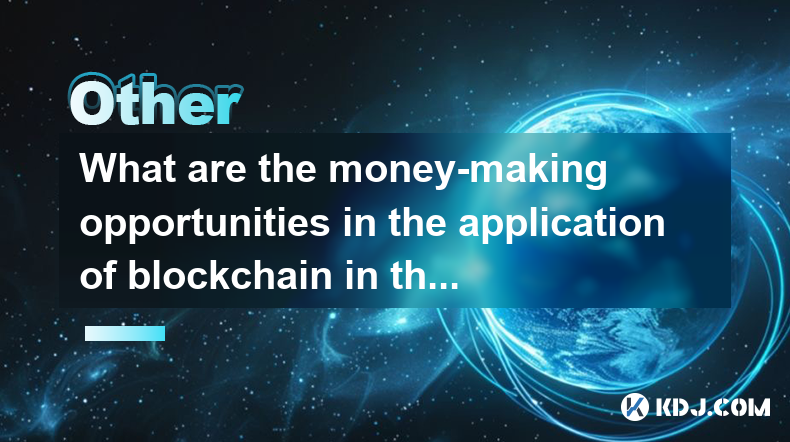
What are the money-making opportunities in the application of blockchain in the medical industry?
Apr 03,2025 at 03:35am
The integration of blockchain technology into the medical industry presents a myriad of money-making opportunities that can revolutionize healthcare systems. Blockchain's inherent characteristics, such as transparency, security, and immutability, make it an ideal solution for various medical applications. By leveraging blockchain, companies can develop ...
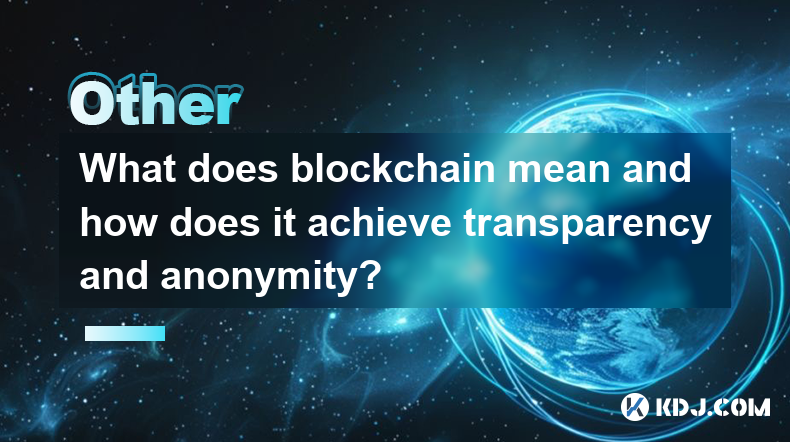
What does blockchain mean and how does it achieve transparency and anonymity?
Apr 03,2025 at 11:28am
Blockchain technology is a decentralized, distributed ledger that records transactions across numerous computers. It ensures that once data is recorded, it cannot be altered retroactively without the alteration of all subsequent blocks and the consensus of the network. This technology underpins cryptocurrencies like Bitcoin and Ethereum, providing a sec...
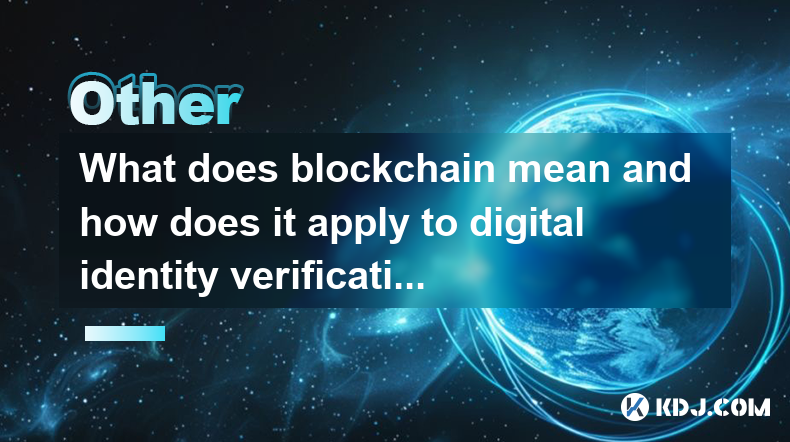
What does blockchain mean and how does it apply to digital identity verification?
Apr 03,2025 at 02:21am
Blockchain technology, at its core, is a decentralized and distributed digital ledger used to record transactions across numerous computers. This ensures that the recorded data cannot be altered retroactively without the alteration of all subsequent blocks and the consensus of the network. The concept of blockchain was initially devised for the digital ...
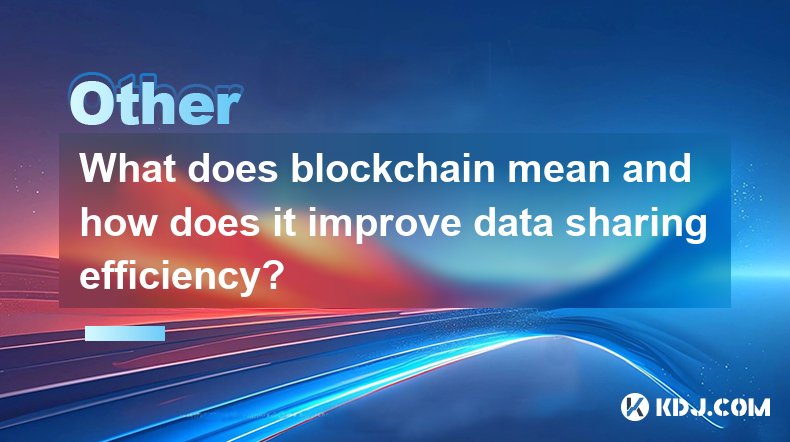
What does blockchain mean and how does it improve data sharing efficiency?
Apr 03,2025 at 03:15pm
Blockchain is a decentralized and distributed digital ledger technology that records transactions across numerous computers. This technology ensures that once data is recorded, it cannot be altered retroactively without the alteration of all subsequent blocks and the consensus of the network. This characteristic makes blockchain highly secure and transp...

What are the future development trends of blockchain game development?
Apr 03,2025 at 05:00am
Blockchain technology has revolutionized various industries, and gaming is no exception. As we look to the future, several trends are set to shape the development of blockchain games. These trends not only promise to enhance the gaming experience but also to integrate blockchain technology more seamlessly into the gaming ecosystem. Let's explore these t...

What are the maintenance costs of blockchain system development?
Apr 03,2025 at 06:07pm
The maintenance costs of blockchain system development are multifaceted and depend on various factors. These costs can include technical maintenance, security updates, infrastructure expenses, and personnel costs. Understanding these elements is crucial for anyone planning to develop or maintain a blockchain system. Technical MaintenanceTechnical mainte...

What are the money-making opportunities in the application of blockchain in the medical industry?
Apr 03,2025 at 03:35am
The integration of blockchain technology into the medical industry presents a myriad of money-making opportunities that can revolutionize healthcare systems. Blockchain's inherent characteristics, such as transparency, security, and immutability, make it an ideal solution for various medical applications. By leveraging blockchain, companies can develop ...

What does blockchain mean and how does it achieve transparency and anonymity?
Apr 03,2025 at 11:28am
Blockchain technology is a decentralized, distributed ledger that records transactions across numerous computers. It ensures that once data is recorded, it cannot be altered retroactively without the alteration of all subsequent blocks and the consensus of the network. This technology underpins cryptocurrencies like Bitcoin and Ethereum, providing a sec...

What does blockchain mean and how does it apply to digital identity verification?
Apr 03,2025 at 02:21am
Blockchain technology, at its core, is a decentralized and distributed digital ledger used to record transactions across numerous computers. This ensures that the recorded data cannot be altered retroactively without the alteration of all subsequent blocks and the consensus of the network. The concept of blockchain was initially devised for the digital ...

What does blockchain mean and how does it improve data sharing efficiency?
Apr 03,2025 at 03:15pm
Blockchain is a decentralized and distributed digital ledger technology that records transactions across numerous computers. This technology ensures that once data is recorded, it cannot be altered retroactively without the alteration of all subsequent blocks and the consensus of the network. This characteristic makes blockchain highly secure and transp...
See all articles























































































